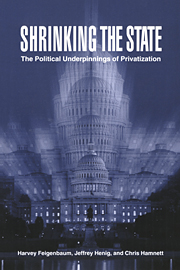Book contents
- Frontmatter
- Contents
- Acknowledgments
- 1 Privatization and theories of state growth
- 2 The political underpinnings of privatization
- 3 The United Kingdom: from pragmatic to systemic privatization
- 4 France: from pragmatic to tactical privatization
- 5 The United States: the co-optation of pragmatic initiatives by agents of systemic change
- 6 The boundaries of privatization
- Index
2 - The political underpinnings of privatization
Published online by Cambridge University Press: 08 March 2010
- Frontmatter
- Contents
- Acknowledgments
- 1 Privatization and theories of state growth
- 2 The political underpinnings of privatization
- 3 The United Kingdom: from pragmatic to systemic privatization
- 4 France: from pragmatic to tactical privatization
- 5 The United States: the co-optation of pragmatic initiatives by agents of systemic change
- 6 The boundaries of privatization
- Index
Summary
In chapter I we noted that literature in political science of the 1960s and 1970s would not have predicted the privatization movement of the 1980s and 1990s. Most analysts were struck by the growth of the welfare state and focused on theories that would explain its rise. While writers anchored in the disciplines of political science, public administration and public choice economics were not uncritical of the highly interventionist states that grew up in virtually all developed countries, there was little in their explanations that would have predicted a turnabout in the 1980s. In this chapter we return to these theoretical perspectives to capture their respective views and consequent advocacy of the privatization movement. Because policies are not always what they seem, and because all policies affect citizens unevenly, with some benefiting and others losing, we think it is useful to look at how privatization reaches the agenda of different political actors.
Essentially, it is our contention that the very mixed bag of policies which broadly fit under the rubric of privatization can best be categorized in terms of the motives of their advocates. The extensiveness and diversity of privatization policies, found in countries as different as United States and Uzbekistan, can be understood by relating the policy outcomes to a variety of political agendas. For this reason we offer a typology of privatizations based on the politics which underpin them. Moreover, because policies can have unforeseen results, we also consider at the end of this chapter alternative scenarios by which privatizations have unintended political consequences.
- Type
- Chapter
- Information
- Shrinking the StateThe Political Underpinnings of Privatization, pp. 36 - 58Publisher: Cambridge University PressPrint publication year: 1998
- 2
- Cited by



